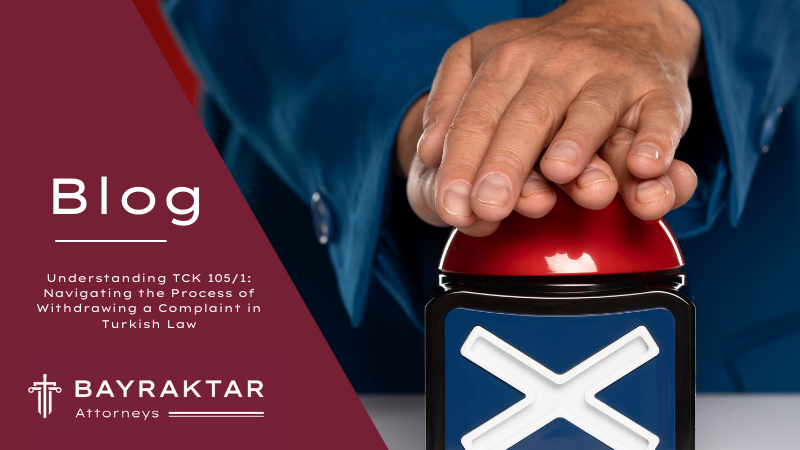
Understanding TCK 105/1: Navigating the Process of Withdrawing a Complaint in Turkish Law
When residing, visiting, or conducting business in any country, it’s essential to have a grasp of its legal framework. For foreigners interfacing with Turkish law, it’s important to understand key provisions like tck 105/1 şikayetten vazgeçme, or roughly translated, “withdrawing a complaint under Article 105/1”.
This clause is a part of the Turkish Penal Code (TCK) and deals with the process through which the victim of a crime can withdraw their complaint, effectively halting legal proceedings in specific circumstances.
In this blog, we’ll explore this facet of Turkish law, offering insights into how it operates and what it entails for both the complainant and the accused.
What is TCK 105/1?
TCK 105/1 refers to Article 105, Clause 1 of the Turkish Penal Code. This provision grants the victim of a crime the right to withdraw their formal complaint against the perpetrator. However, this is only applicable to certain offenses and under specific conditions.
The ability to withdraw a complaint is especially relevant in offenses involving a complainant and a perpetrator who are in a close relationship, such as family members, spouses, or close friends, where reconciliation may be preferable over litigation.
The Significance of Withdrawing a Complaint
Within the framework of the Turkish Penal Code, withdrawing a complaint has the potential to alter the course of legal proceedings significantly. Depending on the nature of the crime and the stage at which the withdrawal occurs, the act can lead to a suspension of prosecution or even the dismissal of the case.
It’s crucial for the parties involved to comprehend the implications of tck 105/1 şikayetten vazgeçme to ensure that the decision to withdraw a complaint is made with full awareness of the legal consequences.
Eligible Offenses and Conditions
It’s important to note that not all offenses under Turkish law permit the withdrawal of a complaint. The applicability of TCK 105/1 is typically confined to offenses that require a complaint from the victim to prompt prosecution.
These are often minor crimes or ones of a personal nature. Additionally, there are a set of conditions that must be met for the withdrawal to be considered valid by Turkish courts. For instance, the withdrawal should be voluntary, and any reconciliation should not contravene public order or good morals.
How to Withdraw a Complaint
Navigating the process of withdrawing a complaint under Turkish law involves several procedural steps. Initially, the complainant must expressly declare their intent to withdraw the complaint to the relevant authorities, often in writing.
This declaration must then be submitted within a certain timeframe, and the complainant may be required to appear before a judge or prosecutor. Understanding the technicalities is crucial as deviations or errors during the process may invalidate the withdrawal, thereby allowing legal proceedings to continue.
Whether you’re facing a legal situation for the first time in Turkey or you’re seeking guidance on resolving a dispute, understanding provisions such as TCK 105/1 Şikayetten Vazgeçme is essential. It is always advisable to seek legal consultation from experienced attorneys, such as Bayraktar Attorneys, to ensure all actions are within the boundaries of Turkish law and to protect your rights and interests every step of the way.







